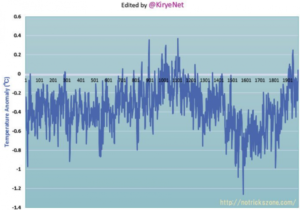by Kirye, October 23, 2048 in NoTricksZone
Dr. Fukai also points out that global vegetation coverage increased by 11% in 29 years, from 1982 to 2010, as increasing CO2 has helped the greening of the Sahel and Sahara Desert. He contradicts the often heard media claims that drought is spreading globally, writing: “The media spread the word that desertification is progressing globally, but practically the desert is greening through CO2.” […] “Everyone should be aware that increasing CO2 concentrations in atmosphere is not in itself harmful, but it’s a good thing.”
No correlation
Dr. Fukai also shows that the earth’s temperature change is not simple and does not correlate at all with CO2. He shows graphs from D. M. Etheridge et al., Mauna Loa Observatory and the temperature data from Moberg et al. (2005).

Chart: ftp://ftp.ncdc.noaa.gov/pub/data/paleo/contributions_by_author/moberg2005/nhtemp-moberg2005.txt
The retired Japanese professor writes that at around 1000 A.D. — the Medieval Warm Period — there were no signs showing CO2 concentration was higher. A temperature graph using data from Moberg et al. (2005) shows the Medieval Warm Period appears clearly and that CO2 was in fact around 280 ppm at that time.
…
by Anthony Watts, October 23, 2018 in WUWT
Operation IceBridge, NASA’s longest-running aerial survey of polar ice, carried a flight over the northern Antarctic Peninsula on Oct. 16, 2018. During the flight, IceBridge senior support scientist Jeremy Harbeck spotted two rectangular icebergs floating among sea ice just off of the Larsen C ice shelf.
…
by Paul Homewood, October 2018, in GWPF
This paper (.pdf 17 pages) reports the results of a detailed analysis carried out using published UK Met Office data up to 2017. These show:
- UK temperatures rose during the 1990s and early 2000s. This rise is associated with a similar increase in near-coastal sea surface temperatures. There has been no rise in the last decade.
- Seasonal temperatures have followed a similar pattern: a rise during the 1990s, but a levelling off since.
- This sudden rise in UK land temperature is not unprecedented, with the Central Eng- land Temperature series (CET) showing a similar occurrence in the early 18th century.
- Analysis of CET shows that despite the rise in average summer temperatures, there has been no increase in the highest daily temperatures, or the frequency of extreme high temperatures, in recent years. In fact the opposite is true. Heatwaves were far more intense in 1975 and 1976, when there were thirteen days over 30◦C. By contrast, between 2007 and 2017 there have only been two such days. (Note that there was also only been one day over 30◦C in the summer of 2018). The highest daily temperature on CET was 33.2◦C, set in 1976 and equalled in 1990.
- …
by David Middleton, October 23, 2018 in WUWT
Scientists are very divided on climate change
Much of my rebuttal was put together from prior WUWT posts on this subject, there’s at least one new addition to the vast evidence of scientific division (Stenhouse et al., 2017).
Stenhouse et al., 2014 told us that atmospheric scientists are very divided on climate change over the past 150 years.
…
89% × 59% = 52%… A far cry from the oft claimed 97% consensus.
…
by J. Haskins & H.S. Burnett, October 23, 2018 in ClimateChangeDispatch
In a world riddled with climate-change doomsday predictions, a small but growing number of scientists are saying the highly touted climate models predicting steadily increasing global temperature due to humans’ carbon-dioxide emissions are wrong and that Earth could soon face something even direr: global cooling.
One such climate scientist is Valentina Zharkova, an astrophysicist at Northumbria University in the United Kingdom.
Zharkova and her team of researchers say that based on mathematical models of the Sun’s magnetic activity, it’s likely Earth will experience decreasing magnetic waves over a 33-year period beginning in 2021.
Zharkova is not alone.
…
La géologie, une science plus que passionnante … et diverse

